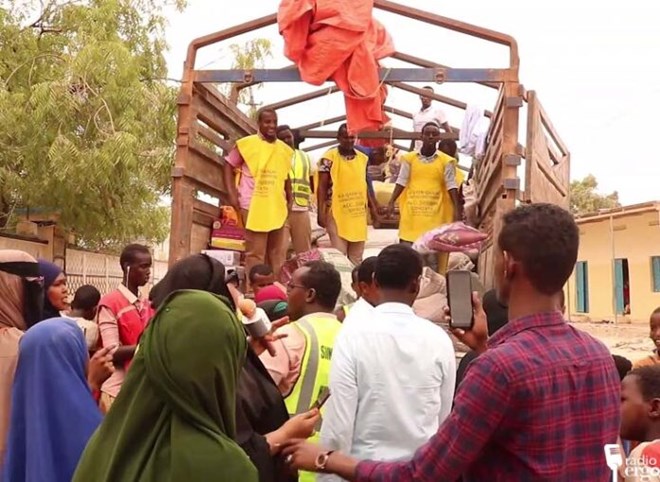
Thursday November 28, 2019

There has been a huge outpouring of public generosity from Somali communities across the country and beyond for the hundreds of thousands of victims of floods that have wreaked havoc in the southern regions of Hiran, Gedo, Jubaland and Bay.
Adding up the amounts that fundraising committee leaders in Bossaso, Garowe, Qardho, Baran, Lasanod, Mogadishu, Galkayo, Kismayo, Abudwak, Guriel, Mataban, Borama and Dhusamareb told Radio Ergo they raised for Beledweyne flood victims comes to a total of around $2 million.
Sheikh Fuad Aflow, leader of the fundraising committee in the northern port city of Bossaso, said a consignment of 12,700 bags of foodstuff worth $420,000 was transported by 21 trucks from Bossaso to Beledweyne between 19 and 21 November. The money was raised from donations by Puntland authorities, Puntland diaspora community, and locals living in Puntland
“We cannot resolve the problem 100 per cent in Beledweyne, but we are planning to deliver sizable aid. We want to show Beledweyne our brotherhood,” Aflow said.
Cooked food like chapattis, dried food, and clothing collected in Garowe were delivered to flood victims in Hiran from 31 October to 2 November, according to Mohamed Yussuf Tigay, a youth committee leader in Garowe. Another 12 lorries of supplies were sent to Beledweyne from Galkayo, Guriel, Dhusamareb, Mataban and Abudwaq.
“This was aid fit for an emergency. For example, ready to eat food including dates, biscuits, tinned fish, and milk powder, and clean water from Garowe town was delivered to the people. If the people have no place to light a fire for cooking, it is useless to give them uncooked rice and pasta,” Tigay said.
In Mogadishu, private companies and civil society groups donated $1 million, according to Sheikh Ali Wanjis, a fundraising organiser in the capital. He told Radio Ergo they distributed $750,000 immediately in Beledweyne, and the rest was destined for distribution among families in Bardale and Jowhar.
Money has also been raised from Somalis in neighbouring countries. Sheikh Mohamed Abdi Umul, a Somali religious leader in Kenya, is reported to have delivered $303,000 raised by Somalis in Kenya when he visited Beledweyne in November.
However, whilst the public desire to help is strong, there is little if any scrutiny of the accountability and transparency of the locally run campaigns.
Sheikh Fuad Aflow said the aid from Bossaso was distributed to 7,000 flood-affected families. He told Radio Ergo that a social committee in Beledweyne selected the beneficiary families based on their needs. The committee from Bossaso, he said, was also involved in supervising the distribution.
But many flood victims in Beledweyne have complained to Radio Ergo of being excluded because aid is distributed by the most powerful clans.
The fundraising campaigns across the country have been led by religious leaders, youth and other civil society groups, with rallying events held in mosques, marketplaces and other public places, and on TV stations.
Maryam Haji Abbass, an activist in the northern town of Lasanod, described how local women stepped up in the fundraising.
“When I saw the first picture of my brothers and sisters in Beledweyne town, I became emotional. I stood up for them and started the campaign to support them, and we have succeeded,” she said.
Amid the emotional and proud response, there has not been any public demand for information about how the needs of the flood victims are being assessed, who is included, and how the huge sums raised are spent. Local aid efforts have been separate from the international flood response.
“These committees are always led by the respected people like religious leaders, elders, businessmen and scholars. That is why the people trust them with the money,” a local journalist in Puntland said.
The military court prosecutor in Hiran, Mohamed Abdikadir Mohamed, told Radio Ergo that Somali forces impounded two lorries after a tip off that they had unloaded relief items sent from Galgadud region at business stores in Beledweyne town.
Beledweyne’s district commissioner, Osman Dhi’isow Dhubow, denied that any aid was being diverted. He said the aid delivered was handled by a committee of individuals from the Hiran business community and youth groups, under the supervision of the regional and district authorities.
Responding to allegations of exclusion of certain beneficiaries, Dhubow told Radio Ergo that 30,000 families had been assisted so far with aid or cash.
“It is possible that they want more than what they got, or they misunderstood how the distribution is being done, but we always convinced them to be patient and wait for another time to get their chance,” he said.
Elsewhere, a group of militiamen held up a convoy of 21 trucks from Bossaso in Bandiiraley village, 60 km south of Galkayo, on 16 November demanding payment of taxes. Following an outcry on social media, the Mudug administration intervened and the convoy was able to continue the journey to Beledweyne.
Meanwhile, Ahmedweli Abukar Ahmed, humanitarian director at the Federal Ministry of Humanitarian Affairs and Disaster Management in Mogadishu, said the local efforts had helped to ease the crisis.
“Somali people can do more than this, and at this moment they have done their best,” he said.